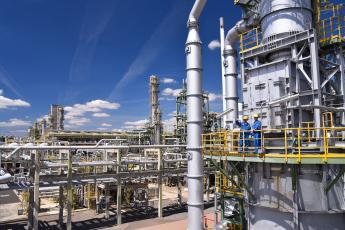Before I stated my career at AFPM in 2003, there was a committee called the “Computer Committee”. This committee consisted of operating companies and associate member companies. The company representatives on this committee were the process control engineers. Wikipedia defines “process control” as “… an engineering discipline that deals with architectures, mechanisms and algorithms for maintaining the output of a specific process within a desired range. For instance, the temperature of a chemical reactor may be controlled to maintain a consistent product output.”
Simply put, process control ensures that the manufacture of fuel and petrochemical products operate safely and within the desired control parameters (pressure, temperature, flows, and more).
In the late 1990’s, this committee oversaw investigating the possible implications of “Y2K” to the refining and petrochemical industries.
By the dawn of the 21st century, computers had evolved from mainframes to PC’s. With this evolution, AFPM members were using computers to do more efficient control and optimization of the processes. By 2003, everybody had a PC and the Computer Committee was focusing on the many ways we used computers to support the business instead of on the hardware. Thus, in 2003 the Computer Committee renamed themselves as the “Plant Automation and Decision Support Committee” or “PADS”.
In 2005, the Cybersecurity Subcommittee was created as a subcommittee the PADS Committee, as cybersecurity issues warranted a separate group with specialized skills from PADS. In the ensuing years, the Cybersecurity Subcommittee has become one of the largest and important committees in AFPM.
As technology in the refining and petrochemical industries has advanced and grown, so did the scope of the PADS Committee. It included distributed control systems, programable logic controls, and applications supporting these host systems. But the technology was outpacing the scope of the Committee. Thus, in 2016, the committee became the Operational Planning, Control & Automation Technologies Committee, or “OPCAT”.
The scope of the presentations being presented at the OPCAT track of the 2017 AFPM Operations and Process Technology Summit gives a good overview of the areas now covered: “Control Systems Life-Cycle Upgrades”, “Refinery-wide Optimization”, “Supporting Today’s Simulation Needs”, “Big Data and IIoT” and more.
As technology progresses, the name of the committee will probably change. But whatever the name, this AFPM committee always will be on the leading edge of technology for the refining and petrochemical industries today and into the future.


